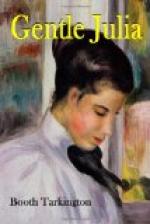“Papa was talking about you this very morning at breakfast,” she said; and she spoke the truth. “He said he dreamed about you last night.”
“He did?”
Julia nodded sunnily. “He dreamed that you and he were the very greatest friends!” This also was true, so far as it went; she only omitted to state that Mr. Atwater had gone on to classify his dream as a nightmare. “There!” she cried. “Why, of course he’d miss you—he’d miss you as much as he’d miss any friend of mine that comes here.”
Noble felt a sudden rush of tenderness toward Mr. Atwater; it is always possible to misjudge a man for a few hasty words. And Julia went on quickly:
“I never saw anybody like you, Noble Dill!” she exclaimed. “I don’t suppose there’s anybody in the United States except you that would be capable of doing things like going off to be an officer in the Chinese army—all just any minute like this. I’ve always declared you were about the most reckless man I know!”
Noble shook his head. “No,” he said judicially. “I’m not reckless; it’s just that I don’t care what happens.”
Julia became grave. “Don’t you?”
“To me,” he said hurriedly. “I mean I don’t care what happens to myself. I mean that’s more the way I am than just reckless.”
She was content to let his analysis stand, though she shook her head, as if knowing herself to be wiser than he about his recklessness. A cheerfulness came upon them; and the Chinese question seemed to have been settled by these indirect processes;—in fact, neither of them ever mentioned it again. “I mustn’t keep you,” she said, “especially when you ought to be getting on downtown to business, but——Oh!” She gave the little cry of a forgetful person reminded. “I almost forgot what I ran out to ask you!”
“What was it, Julia?” Noble spoke huskily, in a low voice. “What is it you want me to do, Julia?”
She gave a little fluttering laugh, half timid, half confiding. “You know how funny papa is about tobacco smoke?” (But she hurried on without waiting for an answer.) “Well, he is. He’s the funniest old thing; he doesn’t like any kind very much except his own special cheroot things. He growls about every other kind, but the cigars Mr. Ridgely smokes when he comes here, papa really does make a fuss over! And, you see, I don’t like to say ‘No’ when Mr. Ridgely asks if he can smoke, because it always makes men so uncomfortable if they can’t when they’re sitting on a veranda, so I wondered if I could just tactfully get him to buy something different from his cigars?—and I thought the best thing would be to suggest those cigarettes you always have, Noble. They’re the ones papa makes the least fuss about and seems to stand the best—next to his own, he seems to like them the most, I mean—but I’d forgotten the name of them. That’s what I ran out to ask you.”
“Orduma,” said Noble. “Orduma Egyptian Cigarettes.”




